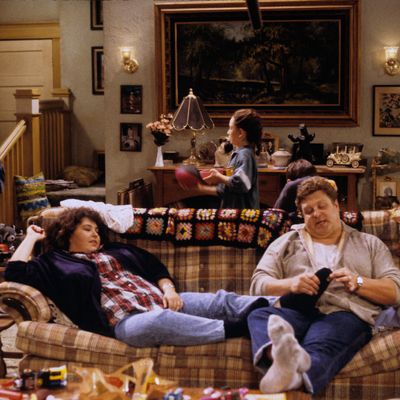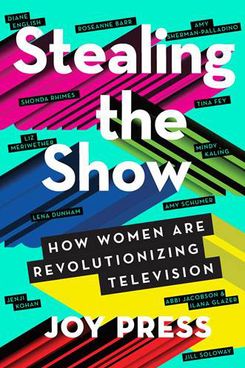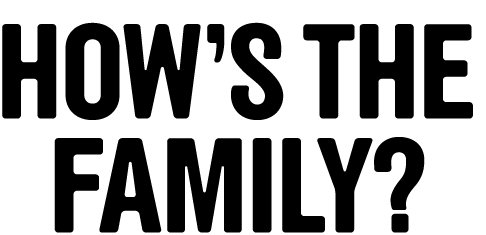
As long as there’s been TV, the family has been one of its favorite go-tos. All week long, Vulture is exploring how it’s been represented on our screens. The following is an excerpt from Joy Press’s forthcoming book, Stealing the Show: How Women Are Revolutionizing Television, out March 6.
A family sits around a cluttered kitchen table, arguing and roughhousing. Finally, the man at the table leans over to smooch his wife. She cheerfully wipes off the kiss, letting loose a peal of bawdy laughter.
That was how America met the Conner family on October 18, 1988. In its minute-long opening sequence, Roseanne conveys a concrete sense of this rambunctious working-class household. There are bills on the table that are probably overdue, and kids interrupting as their parents shrug them off. There are dowdy clothes and bad hair and faded wallpaper. But most of all, there is that glorious laugh of Roseanne’s hanging in the air, a perfect chord of raucousness and affection. It signals a family life bound by love but not muddied by sentimentality.

When it premiered on October 18, 1988, Roseanne was an instant hit: watched by more than 21 million viewers, the debut episode beat the World Series game it was up against (LA Dodgers versus Oakland A’s) to win the night’s ratings.
By the end of the season, it had become the country’s number two prime-time series, topped only by another family sitcom, The Cosby Show. Although there was a small but well-loved lineage of classic comedies set in ordinary American homes, from The Honeymooners to All in the Family, Roseanne depicted a family more real than any seen on television before. And the show’s originality resides above all in the character of Roseanne herself.
No television sitcom had ever revolved around such a fierce, sharp- tongued virago. Take the scene in the first episode in which five women sit around a table during their break from the assembly line at the plastics factory, talking trash about men. One of the workers picks up a chocolate donut and quips, “A guy is a lump, like this donut. Okay. So, first, you gotta get rid of all this stuff his mom did to him,” she says, flicking toppings off the donut’s surface. “Then you gotta get rid of all that macho crap that they pick up from the beer commercials. And then, there’s my personal favorite, the male ego,” she says, devouring a chunk of the donut with a mischievous wrinkle of her nose.
That donut crusher? It’s Roseanne.
Murphy Brown, a show about a wealthy WASP propelled by an unshakable sense of her own cultural power, became a critical darling and standard-bearer of feminism over at CBS. Roseanne, meanwhile, spoke to a frustrated majority struggling in Reagan-era America, where the minimum wage stayed frozen at $3.35 an hour for nearly a decade and where the income gap between rich and poor grew ever wider. The Conners weren’t a saccharine brood like the families of Full House or Growing Pains; their crowded, shabby home wasn’t the role-model household of The Cosby Show or Family Ties. But neither was Roseanne a cartoonish parody like Married … with Children. You laughed with the Conners, not at them, and the laughter was often accompanied by twinges of empathetic pain.
Roseanne appeared at a time of economic uncertainty, as the stock market crash of October 1987 curtailed the greedy, Dynasty-style excesses of the Reagan era. Rarely had the American working class had such poignantly authentic representatives on TV. But the series made viewers laugh more often than cry with its stinging one-liners.
“Mother … our school’s having a food drive for poor people,” daughter Becky tells Roseanne. “Tell ’em to drive some of that food over here,” she snaps back. When young son DJ finds an unemployed Roseanne trying to sell magazine subscriptions by phone, he asks what she’s working on. She doesn’t miss a beat: “I’m ordering new children.”
The series often played up the shtick of Roseanne Conner as a “bad mom” — a persona Barr helped propagate and that would pick up speed in pop culture decades later, in books such as Ayelet Waldman’s 2009 memoir Bad Mother and the 2016 movie Bad Moms, with women coolly wearing the term as a badge of honor. A refusal of the whole “having it all” con, it became a way of pushing back against the guilt and unrealistic expectations of perfect motherhood. Why pretend you’d rather change a baby’s diaper than kick back with a margarita? As Waldman wrote, “We shrug at the orange Cheetos dust smeared across our children’s mouths … happy to confess our sins because we are confident that those who come closest, and with the most sanctimony, to emulating the self-effacing, self-sacrificing, soft-spoken, cheerful, infinitely patient Good Mother are the real Bad Mothers.”
Roseanne offered a rare public admission — in the midst of the religious right’s family values crusade — that parenthood could be a rotten, soul-sapping affair, especially when you throw a low-wage job or two into the mix. Roseanne is often sarcastic and dismissive to her kids. (When DJ asks why she’s so mean, she replies, “Because I hate kids … and I’m not your real mom!”) In the third season, she gets into a pissing match with new next-door neighbor Kathy, an upwardly mobile helicopter mom who ticks off Roseanne for not knowing where DJ went with her son. “I have three kids and a job, so I can’t be everywhere,” Roseanne snaps back. “I gotta trust my kids, and they’re still alive, so I have obviously done something right.”
“I had three kids, and that’s how I lived,” Barr told me recently. “I wanted to be a different kind of mother in my real life and on TV. I was kind of obsessed with it because, as a kid, Donna Reed — well, all the mothers on TV — were not like what I knew.” Those classic TV mothers were horrible, she said, “because they were always making the husband look like a dolt. What do they call it? The fist in the velvet glove.” Whereas the Roseanne character “was kind of like my grandma. She was a real Jewish matriarch, and she ruled with a wooden spoon. You did not want to get hit on the upper thigh with that thing.”
By the midpoint of the series, though, Barr was living a very different life offscreen — the surreal existence of a superstar, dogged by tabloids, divorced from everyday reality. The traits that had made Barr such a supernova — her fuck-everyone-and-say-anything attitude, her compulsion to go too far and push too hard — were the same ones that would inevitably trip her up over the course of the series’ nine-season run. Her power came from being an outsider, and eventually she would provoke the establishment into casting her out again.
“It was when she and Tom [Arnold] broke up — that’s when things went completely haywire,” said Amy Sherman-Palladino, a longtime writer on the show. “That’s when things started happening like the lottery.” In the show’s final season, Roseanne Conner wins $108 million in the state lottery, triggering a series of episodes that bear no resemblance to anything that had come before them. Jackie dates a prince, and she and Roseanne fly to New York City, where they hobnob with the jet-set crowd. The sisters mingle with a magazine editor played by Marlo Thomas and a perfume magnate played by Arianna Huffington. Absolutely Fabulous characters Patsy and Edina (Joanna Lumley and Jennifer Saunders) also pop up out of nowhere in that episode.
Barr never discussed her rationale for the lottery plotline much, but she did tell Spin magazine that it was her way of returning the show to its roots (the saga of her real life) and to communicate “how dreams come true. You know, the American dream and how these incredible things happened to me, who used to be this housewife with all these kids.” She said she’d always planned to end season eight with Roseanne Conner doing stand-up comedy: “I was always showing these poor people, who were working really hard but never getting ahead. I realized I came here literally out of a trailer because I didn’t believe that. And I have to correct that because I can’t leave these characters in a place where their hard work never pays off.” And yet, in the May 1997 series finale, the lottery is revealed to be a fantasy — a fictional tale written by Roseanne Conner to console herself in the wake of Dan’s death from a heart attack.
Roseanne Barr is now a Ghost of Television Past, so strange and contradictory it’s hard to believe she was once one of America’s biggest TV stars. From her prime-time pedestal, she brought all kinds of progressive notions about gender and class to the homes of a nation convulsed by a culture war. She found a way to turn the insult of being poor and a woman inside out: Although Roseanne Conner sometimes pretends to be lazy and a lousy mom, she is neither. Always finding a way to keep the family afloat, she supports her kids through elopements, pregnancy, and disappointments, and she bolsters her husband through job loss, depression, and illness.
Murphy Brown and Roseanne launched and ended around the same time, and many commentators saw the shows as two sides of the same coin. At a moment when a retrogressive notion of “family values” loomed over the culture, both shows provided a realistic and contemporary conception of what a family could be — fluid, imperfect — in the process, paving the way for future shows such as Modern Family, Fresh Off the Boat, and Transparent.
Decades after they worked as writers on Roseanne, Eileen Heisler and DeAnn Heline created The Middle, a sitcom about a working-class Indiana family struggling to pay bills and do right by their scrappy, eccentric kids. “The Middle’s roots are Roseanne for sure,” Heline says. “We loved the marriage of Dan and Roseanne and the dignity of people trying hard.”
Copyright © 2018 by Joy Press. From the forthcoming book STEALING THE SHOW by Joy Press, to be published by Atria Books, a Division of Simon & Schuster, Inc. Printed by permission.


